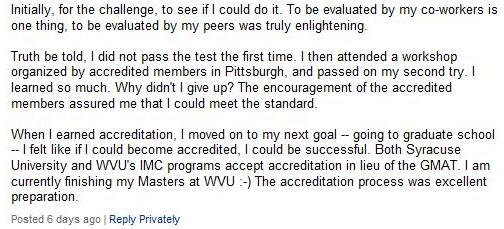 A couple of weeks ago we started talking about accreditation on Twitter (at least, I did). I serve on IABC’s Accreditation Council so, clearly, think it’s a good thing. I was curious about what others thought, so I asked my networks why they had pursued, or were pursuing, accreditation, and what value they derived from it.
A couple of weeks ago we started talking about accreditation on Twitter (at least, I did). I serve on IABC’s Accreditation Council so, clearly, think it’s a good thing. I was curious about what others thought, so I asked my networks why they had pursued, or were pursuing, accreditation, and what value they derived from it.
What’s the Value of Accreditation?
The response overwhelmed me, not just by how many there were, but by how strongly people feel about accreditation.
There were a few recurring themes: curiosity as to whether one “measured up,” validation of one’s approach to communications, and value in staying involved with process by being a mentor or grader. On LinkedIn, Mary Hills, ABC, who’s director of marketing for the Council said:

And Jason King, ABC, accreditation liaison for IABC/Washington, said:

You can read all the LinkedIn answers here, but I found Maureen Ryan, ABC‘s answer particularly interesting:

Maureen’s accreditation was accepted by two universities in lieu of the GMAT. Bill Spaniel, ABC made good use of it too:

Accreditation v. MBA
So: you’re thinking of getting accredited, but should you be considering an MBA instead? What if you already have one, does accreditation still make sense? Here’s what Dora Smith, currently an accreditation candidate, told me:



Sue Johnston, MBA, ABC said:


The “Official” Accreditation Value Study
A study on the value of accreditation was conducted by L.C. Williams & Associates for IABC late in 2007. I encourage you to read the executive summary, which is extremely interesting; some key findings were:
- Seventy-nine percent of ABC respondents said the designation improves their résumés;
- Sixty percent said it’s given more credibility to their department or organization;
- Eighty percent said it benefits the profession by providing a professional global standard; and
- More than one-half of them (53%) said that since being accredited, they ensure that evaluation, measurement and monitoring are part of their plans.
So far, then, we have increased credibility, greater confidence, more rigorous use of communication best practices and advancing the profession.
Not All Peaches and Cream
Amy Mengel made several points from a different perspective; first, that accreditation is not inexpensive, when you consider the initial cost as well as the cost of maintaining it. She said (via email, and all emphasis is mine):
“I’ve worked in corporate communications for about five and a half years now, so I guess I’m ‘eligible’ to go through the process now if I wanted to. But I’ve never felt like having ABC or APR after my name would help me move up the career ladder or land a better/different job in corporate communications. I got my MBA two years ago (entirely company-funded) and I think that’s been much more relevant and opened more doors for me. I think accreditation would be much more important if I were an independent consultant or ran my own business – or even a member of a smaller PR firm.
If I were to do it, I think my reasons would be purely personal – for the experience and personal knowledge gained from going through the process. If I set out to do it with the expectation that it would get me a better job, a promotion, a pay raise, etc., then I think I would be disappointed. It’s not a credential that most hiring managers in corporate comm roles seem to be familiar with or understand – it’s not like a CPA for accountants where it’s almost expected that practitioners have it.”
And, finally:
“I’ll also admit that I think a lot of these programs (beyond PR/comm. accreditations) are ‘profit centers’ for organizations… I can still be a good communicator without it, and the variety of designations handed out (IABC, PRSA, AMA, etc.) somewhat diminishes the strength of any one accreditation program.”
Gulp.
My $0.02
I promised Sarah Ann Walters I’d also share my opinion and story, so here they are:
I earned my accreditation four years ago, starting the process just after moving to DC. I did it because I don’t have formal training in PR, and I wanted to know whether my work – which I “thought” was good – really measured up. I attended an accreditation “fun shop” held by Ned Lundquist, ABC (who’s also founder and editor of Ned’s Job of the Week), and since I wasn’t working (I’d just moved to DC, remember?), figured I might as well start on my accreditation.
It took me one and a half years, from application to certificate. I paid for it myself, but it’s one of the best things I’ve ever done. It wasn’t cheap and yes, it was time-consuming. But I grew in confidence and learned a great deal which was reflected in my work, which led to the promotions and pay raises.
It’s one of the reasons I focus so much on smart measurement as an intrinsic part of strategic communications. It has helped define my approach to business communications, and the business of communications. So while accreditation has certainly been a personal achievement for me, it’s one I’ve put to good use for employers and clients, and they’ve appreciated it.
As to hiring managers being unfamiliar with accreditation… well, that’s a little of a chicken and egg situation, isn’t it? Until we, as accredited business communicators, take the time to educate them, why should they care? The Accreditation Chapter Toolkit might have been designed for chapters, but it’s got a wealth of resources we can all adapt and use to grow awareness of accreditation.
Michael Sponhour, ABC, puts it best:
“I find it works in the most simple ways – I have ABC on my business card, websites etc. and it often prompts questions from people who want to know what it is – that allows me to explain about the whole process. People should not expect an earth-shattering change in their professional career, but a greater sense of confidence and new opportunities to tell their stories without resorting to bragging or overbearing self promotion.”
The Last Word: From Shel Holtz, ABC
There are a lot of issues the PR profession faces, and this post certainly isn’t going to get to grips with them all. But one of the most critical issues is our validity as a profession, which Shel Holtz’ recent post on the issue examined extremely well. I’ll give him the last word:
Accreditation, unlike certification, is voluntary, and there are plenty of outstanding, professional PR practitioners who are not accredited. And it’s as likely you’ll find an accredited communicator who behaves badly as you are to find a lawyer who acts less than ethically.
But when faced with two communicators who are unknown to you, but who both seem to be equally capable, you can be more assured that the accredited communicator is going to perform his job based on a thorough understanding of communications’ models and standards because he has gone through a process and judged knowledgeable.
Photo credit: hartlandmartin. My thanks also to everyone who responded to my query, via Twitter, LinkedIn and email, several of whom are quoted in this post. The lack of space that prohibited me from using all your quotes in no way diminishes the value of your responses – thank you again.
What do you think? Is accreditation important to you, or are you curious about it? What else do you want to know? I’d love to have you join the conversation.


![[EVENT]: PR Hacks for Small Biz (online)](https://shonaliburke.com/wp-content/uploads/2021/06/FB-Ad-1200x800-01-01-01-Copy-500x383.jpeg)







[…] first time I felt I’d actually helped someone by blogging, when I wrote a post on accreditation, because of the conversation that ensued and comments and notes I received long after the post was […]
[…] also want to thank Shonali Burke for her encouragement in To ABC or Not, That is the Question. And many other ABCers on Twitter who answered my questions along the […]
I’ve come to this discussion late, but it’s something that’s been on my mind for a while. I did the APR with the New Zealand Public Relations Institute (PRINZ) in 2000, after time in journalism and PR. I had virtually no tertiary training in communications at the time (I don’t have a degree and had only done a couple of papers for a diploma course), but I was very interested in learning more of the “body of knowledge” from a principles perspective, rather than just techniques. The APR (and reading Grunig’s IABC Excellence study) was a major part of that.
I’ve done a couple of other university papers on marketing and interpersonal communications since then, and found the study very stimulating. I’ve found that it’s one thing to read interesting material, but I am much more focussed if there is a purpose, i.e. to truly understand it so I can explain it in a formal examination sense. The process of reflection helps me understand much better – those internal, mental debates get the ideas churning over.
I’m probably going to try for accreditation for that reason alone. The APR hasn’t got me more pay or even a better job, so I don’t expect to be rewarded by others for having it, but it did give me confidence and a boost. It’s all about how I feel about that I know and my self-confidence
An MBA’s not a goer; I’ve got teenaged kids and am pretty involved in their lives, so I don’t have time (and I’m not particularly interested in something that general).
Iain,
Thanks so much for continuing the conversation. The point you make about the MBA is particularly interesting to me, since I think the reasons you cited are a major factor for lots of folk in a similar situation. I’m so glad you’re considering accreditation. Congratulations!
Tom, thank you for the link.
Erin, that’s a question a lot of folks ask. “Inside PR” recently did a podcast on accreditation that addressed that question too, so you might want to listen to that. And let’s talk!
Hi Shonali –
I love reading your posts and this one is very timely for me. I’d be interested to know the differences between the ABC and APR accredidations. Right now, I’m looking into the APR, however, I’ve heard on more than one occasion that I should really look into the ABC accredidation process as an alternative option.
The following link is to a post I made in August 2005, shortly after earning my ABC designation. It has some thoughts, including comments from other IABC members, which adds something to your discussion. Shonali, thanks for continuing an important discussion.
http://blogs.iabc.com/chair/archives/2005/08/07/what-do-you-call%e2%80%a6-part-3/
Thank you all for the continued feedback, it’s great to have this conversation.
Jen, I’m certainly not going to give you flack! You’re entitled to your opinion and I think we all know accreditation itself doesn’t mean one is a great communicator. What I will say, though, is that the accreditation process is like no school I’ve ever attended (though the written exam certainly reminded me of it!). It’s a much larger, more fluid process, one that is almost living and breathing; rather than being the culmination of one’s learning, it’s a way to not just keep learning but validate one’s work process and standards.
Like you, I never went to school for PR or communication (though my theater training certainly primed me on aspects of communication that come in very handy). It was precisely because of that that I wanted to earn my accreditation, I wanted to know I met global standards for professional, business communication. Over and above that, it brought me into contact with people and thought leaders I honestly don’t know I would have otherwise had access to (like Arik). That adds immense value to my work and life.
Kim – you’re absolutely right. All of us need to do a better job of educating those outside our worlds as to the value of accreditation. It’s the chicken & egg thing…
Shonali–
Great post. I like how you included viewpoints from all sorts of people–from IABC folks to Twitter friends to legends like Shel Holtz.
As you know, I am also accredited on the PR side (APR) and have strong feelings about the certification and process. For me, accreditation was much more about the journey–not the destination. APR certification hasn’t helped me get one job, but it has certainly made a difference in the way I do my job. It hasn’t helped me make more money, but it has given me the confidence to take on new work or projects that I may have shied away from in the past. And through my APR process, I also started to form a network of trusted advisors, colleagues and friends that I still lean to this day for guidance and counsel.
Kudos Shonali. Keep fighting the good fight.
@arikhanson
[…] @shonali nice post – To ABC or Not, That is the Question | Waxing UnLyrical Possibly related posts: (automatically generated)Why Social Media is Disruptively DangerousBusinesses turning to social media for brandingMeasuring Social MediaSony (SNE) finally ends it run of profits […]
Great post, Shonali. I am an APR and proud of my accreditation. In addition, I am accreditation liaison for the PRSA-Tulsa chapter and encourage candidates daily to pursue accreditation.
My main reason for pursuing the APR was for personal achievement. I have set personal and professional goals over the years and work hard to accomplish each. Earning my APR was one of those goals. Having worked with and for several APRs who provided me with strong examples of what a public relations professional should be, I initially thought that earning my APR would be one way I could show them how much I had learned under their tutelage. While that may be the case, I have evolved in my thinking and now see the APR as an achievement that helped me build confidence in my skills. The process one goes through to earn his or her APR (or ABC) is difficult, and I believe I am a more solid professional because of it. I now have the strength to sit at the proverbial table and persuade senior management toward the appropriate communication strategy. Whether or not those three letters mean anything to the others at the table, I honestly don’t care. In the end, I know I worked extremely hard to earn this certification and am extremely proud of my accomplishment.
Thanks you for the discussion you have started here.
I think that IABC (and PRSA, for that matter) need to do a better job of educating the executive recruiter community about their accreditation programs. If the recruiters don’t recognize the value of accreditation on the resume, the hiring manager may never see it.
[…] @shonali nice post – To ABC or Not, That is the Question | Waxing UnLyrical […]
I know I’m going to get a bunch of flack (flack. get it? ;) for this… but accreditation just isn’t in my list of goals.
Maybe it’s because I learned everything in practice v. books. I didn’t go to school originally to become a communicator. I thought I was going to be an engineer. Through various failures and mistakes, along with much hard work, listening, honesty and best practices, I became a good communicator. Both professionally and personally.
I know this because I’ve seen the results. Do I mess up occasionally? Certainly. Can I improve? Absolutely.
But, for me, school doesn’t do it. I doesn’t motivate me. It doesn’t call my name when I want to learn, grow and improve. I challenge myself in other ways that work for me.
I also don’t feel like I have lost out on a job or business ever due to the fact that I don’t have three letters after my name.
That said, if you go for accreditation, it should certainly be for you. No one else.
I recently had the bomb dropped on me. Sitting in a client meeting and was introduced as “an accredited business communicator” without any prompting, scripting or pre-discussion! Then, I was asked, “what is an accredited business communicator?” which gave me the floor to tout the bennies of an ABC. The value of becoming an ABC is best defined by others who seek our knowledge, advice and wisdom.
What a great discussion. Thank you Shonali for initiating and summarizing everyone’s perspective.
Let me put my hat on as the Director of Marketing for the Council…when IABC/Chicago initiated and co-sponsored the Value Study about 18 months ago, one of the key objectives was to find out what managers/clients value working with an ABC. Afterall, they hire us, right? Comments from clients and managers of ABCs suggest a halo effect of credibility transfers to the client work or the manager’s dept. Very cool. Check it out when you read Value Study above.
Now personally, on the MBA vs. ABC. I agree with Jennifer, do whatever you are ready for…the only thing I would add is to do something, even if it is reading the latest book in the field. Initially in my career, it seemed my employer drove my career because I had to learn the industry and how it all worked. As I somewhat figured that out, I delved further into where org com was developing so I could support my employer’s needs. I became more valuable because I brought the communcation industry into the company.
Guess that’s about my $0.01
Have to laugh at all the posturing about the value of PR accreditation hinging on a study conducted BY a PR firm FOR a PR association! You’re drinking the kool-aid.
Libby, did you even read the post and the comments? First, it’s not about “PR” accreditation but accreditation in the PR/communication field (and last time I checked, IABC wasn’t a “PR association”). Second, LC Williams is a PR *and* research firm (and if you think the two can’t coexist, then you’re forgetting one of the basic tenets of good public relations, which is that it be grounded in research). Third – what posturing? If a healthy debate (with both pros and cons) is posturing, let’s posture away.
Do you actually have anything substantial to add to the debate? If so, I welcome it.
Hey Shonali,
Great discussion…I’ve been trying to answer just this question in the last year or so. ABC or MPR – as a local university is now offering 2 streams of a masters program for “PR” (one academic, one practitioner).
Like a lot in life – I think one’s decision to ‘ABC or not’ is based on where you are in life/career. I’m just about to cross the 10 year mark from my last round of formal education…so I think that’s why I’m ready to take MY next step.
I *think* I’ve finally landed on the decision to do my accreditation. Our local chapter is holding it’s first ever Accreditation College that started just last month, and I was invited to attend (a little nudge from a friend). I just couldn’t swing it this year. But I’m psyched to take it on next time it’s run though.
There…it’s public now…that means I can’t back out of it, right?
Great to hear all the comments…
Thank you all for your responses – that’s the best part of any post, in my opinion!
Gail, there are probably many senior practitioners who, like yourself, have gotten so far in their careers that they don’t feel the need for accreditation… and I think that’s completely understandable. If you ever want to explore the ABC further, though, you know where to look. ;-)
Jennifer, that has to be the funnest fun shop EVER. Are you looking for instructors (hint hint)?! Seriously, though, your points are very well taken and I know will be of great value to the Council and Executive Board.
Barb, I remember listening to you sound the call for accreditation at last year’s World Conference. It’s heartening to see folks like Dora respond to it. You’ve been a tremendous ambassador for accreditation – thank you.
Shonali – terrific work, great to see the different perspectives. I have a couple of thoughts on the matter.
I don’t think it is an either/or choice when it comes to an ABC or MBA because that implies that learning & development are a once off event. I’m a big believer in cycles of development. At different points in your life you are open and ready to different types of learning.
When I first heard about accreditation, I snorted. I’d just completed 7 years of university. But now, not only do I want to accreditation, but also another accreditation process with another institution. At this point in my life I am ready for formalised learning again.
I think IABC needs to be aware of the US centric rationale behind accreditation. It is just not really relevant in terms of career income difference in Australia – nobody knows about it, bar the very few who have one. Mind you, as Michael Sponhour notes, just having it on the Business card prompts awareness, and so for us, making links with national training authorities and having it recognised with the government funding bodies (eg credit in post graduate degrees) is a bit step in advocacy.
I love the idea of the ‘funshop’. My Prof Dev & Events team had decided that we were going to do it together this year. After catching up with our NZ counterparts at LI, we are now going to organise a Aus /NZ accreditation retreat with yoga / massage and accredited tutors!
Excellent discussion. Thanks Shonali for leading it. We need to hear from more people, especially those who aren’t accredited yet, to find out what the barriers are, and how we can better serve their career advancement and professional development needs. Keep it coming!
Accreditation is definitely an oft-discussed topic and there are varying views of what it means, what it should mean, whether it’s important, whether it’s necessary, etc. I’m glad you included so many perspectives in this post.
I view accreditation as a valuable mark of achievement. I believe it is not something you need in order to be good at what you do, but something you earn because you’ve proven that you’re good.
Great job in capturing both the ups and downs of accreditation. I hope to start the process in the near future and this further established that it makes sense for me.
Shonali,
Very interesting post! This topic is one I’ve thought about from time to time. I’m not accredited nor do I plan to obtain a certificate, but found this a compelling read just the same.
Cheers,
Stacey
Hi Shonali,
Interesting topic! I haven’t pursued either the ABC or APR designation, and sometimes I feel a bit guilty. I have the usual excuses – not enough time, not enough energy (read: lazy). I do have a master’s in corporate and public communication, but as your readers know, that’s a hidden credential. It appears on the resume, not the business card.